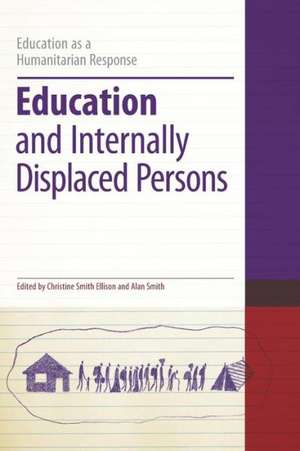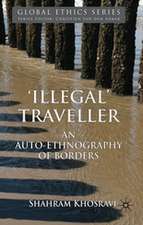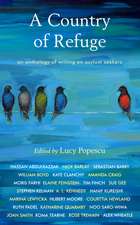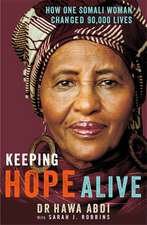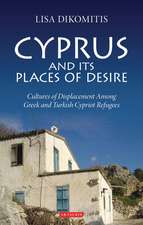Education and Internally Displaced Persons: Education as a Humanitarian Response
Editat de Christine Smith Ellison, Professor Alan Smith Dr Colin Brocken Limba Engleză Paperback – 21 noi 2012
| Toate formatele și edițiile | Preț | Express |
|---|---|---|
| Paperback (1) | 304.10 lei 6-8 săpt. | |
| Bloomsbury Publishing – 21 noi 2012 | 304.10 lei 6-8 săpt. | |
| Hardback (1) | 1066.46 lei 6-8 săpt. | |
| Bloomsbury Publishing – 21 noi 2012 | 1066.46 lei 6-8 săpt. |
Preț: 304.10 lei
Preț vechi: 332.60 lei
-9% Nou
Puncte Express: 456
Preț estimativ în valută:
58.20€ • 63.19$ • 48.88£
58.20€ • 63.19$ • 48.88£
Carte tipărită la comandă
Livrare economică 22 aprilie-06 mai
Preluare comenzi: 021 569.72.76
Specificații
ISBN-13: 9781441196491
ISBN-10: 1441196498
Pagini: 208
Ilustrații: black & white illustrations
Dimensiuni: 156 x 234 x 18 mm
Greutate: 0.32 kg
Ediția:New.
Editura: Bloomsbury Publishing
Colecția Bloomsbury Academic
Seria Education as a Humanitarian Response
Locul publicării:London, United Kingdom
ISBN-10: 1441196498
Pagini: 208
Ilustrații: black & white illustrations
Dimensiuni: 156 x 234 x 18 mm
Greutate: 0.32 kg
Ediția:New.
Editura: Bloomsbury Publishing
Colecția Bloomsbury Academic
Seria Education as a Humanitarian Response
Locul publicării:London, United Kingdom
Caracteristici
Uses international case studies to explore the relationships between education and internally displaced persons.
Notă biografică
Christine Smith Ellison is a Research Associate in Education, Conflict and International Development at the UNESCO Centre, University of Ulster, UK.Alan Smith is the UNESCO Chair in Education at the University of Ulster, UK, where he is Professor of Education.
Cuprins
Series Editor's Preface Colin Brock \ Introduction: A Global Overview of Education and Internally Displaced Persons Christine Smith Ellison \ 1. The Education Sector Response to Hurricane Katrina in the USA Anne Lauten \ 2. Alternative Approaches to Education for Displaced Children inPuntland and Somaliland Silje Sjøvaag Skeie \ 3. Armed Conflict and Education KevinWatkins \ 4. Legislative Protection for Internally Displaced Persons and Education in Colombia Manuel José Cepeda Espinosa \ 5. Educational Challenges of Conflict and Flood Related Displacement in Pakistan Elizabeth Ferris and Chareen Stark \ 6. The Challenges for Education of Protracted Displacement in Sri Lanka Lynn Davies \ 7. Returnees and the Challenges for Education Reform in Bosnia and Herzegovina Marina Bowder and Valery Perry \ 8. Conclusion: The Challenges for the International Aid System Alan Smith \ Index
Recenzii
The authors provide a very valuable addition to the growing literature on education in emergencies, with their emphasis on the education of the internally displaced. The chapters draw out the opportunities, constraints and approaches required for meeting the educational needs of IDPs, some of which have much in common with those applying to refugees and others affected by conflict, but many of which are particular to IDP situations. Several case studies illustrate well the main arguments.
A very useful multidisciplinary analysis of the barriers to education for internally displaced children, shedding light on issues and solutions in a number of different countries. This book is important for examining the high percentage of out-of-school children affected by conflict, who are all too often off-the-radar.
A very useful multidisciplinary analysis of the barriers to education for internally displaced children, shedding light on issues and solutions in a number of different countries. This book is important for examining the high percentage of out-of-school children affected by conflict, who are all too often off-the-radar.
